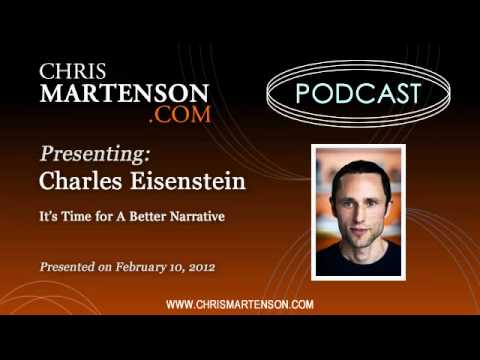Our actions are determined by our beliefs. And our beliefs are shaped by the stories we tell ourselves.
So what happens when the stories we tell ourselves are inaccurate?
The short answer is, we find ourselves engaging in actions that aren't aligned with our best interests.
Charles Eisenstein has made a profession out of studying the intersection of economics and philosophy. And he thinks that over the past several generations, enabled by an unprecedented subsidy of abundant cheap energy, our society has become so far decoupled from natural laws that it has adopted a paradigm of thinking (or "stories") dangerously irrelevant to the future we face.
As resource scarcity increasingly expresses the natural forces that applied to our grandparents' generation and those prior, we are still living under a mindset that assumes predictable, endless growth.
Think about it: Most people reading this and nearly all of our national leaders have come of age in one of the most, if not the most, extraordinary economic periods in history. The exploitation of petroleum fields ushered in a global prosperity never before dreamed of. Decoupling gold from the dollar has allowed those living in the US to increase debt much, much faster than GDP for the past forty years. This behavior is empirically unsustainable -- but to almost all of us, it feels "normal," because it's all we've known.
And it's coming to an end.
The power elite is very much trapped in their obsolete paradigms. Across the political spectrum, everyone’s solution is we have got to reignite economic growth.
So when housing starts rise, that's trumpeted as great news. No one really bothers to mention that we already have like double the housing capacity per capita that we did in the 1950’s. There is something like 19 million vacant units. As long as we are starting to build new houses then that is going to be employment and everything is going to be okay. They are trying to squeeze a little bit more growth out of the system. But as you mentioned, it comes at a higher and higher cost.
It's very much like an alcoholic. In the early days you can maintain the addiction quite easily. Maybe you will have to take a second mortgage out on your house, you will have to lie to your boss a little bit but you can kind of hold things together. Eventually, things fall apart. Eventually, it is your liver. And you can only get that next fix at greater and greater cost.
Now, to extend the metaphor to our system, we have gotten all of the easy oil. We have depleted all the easy resources and the ones that we can easily escape the consequences of. Up until now, or up until recently, if you are creating industrial pollution, radioactive waste, etc., etc. social turmoil, well you can move away from it. you can move to a gated community, you can escape it.
Well, today it is becoming impossible. The consequences are invading even the fortresses of the wealthy in various forms and if we want to keep growth going there is not that much more of nature that we can convert into product and not much more human relationship that we can convert into services. What we can convert comes at a much, much higher cost. You have to excavate the Alberta tar sands and devastate that Eco system. You have to clear cut the forests the fifth time or sixth time and they aren’t really recovering anymore, trees are dying everywhere and we just – the planet can’t take much more of that.
The other thing sometimes economists will say is we can grow the economy of services instead and we can actually have economic growth with less energy because of miniaturization and other technological innovations. So energy really isn’t a constraint and I think that to meet that objection you have to kind of extend the peak argument to include community as well and understand that a lot of the growth and services come at the expense of things people once did for each other and that technology -- just like in the material realm and the social realm -- technology has extended the reach of monetized services.
For example, people never used to pay for communication, now we pay for almost all of our communication. People never used to pay for entertainment but now we pay for almost all of our entertainment. Even when my father was a child he says that in his suburban neighborhood, his whole neighborhood, every Sunday, would get together with guitars and sing folk songs. To imagine that happening in my neighborhood today is ridiculous because we all buy all of our entertainment. There is almost nothing that we don’t pay for anymore.
What is happening is there is just not that much room for economic growth. We are never going to go back to the normal of the 50s and 60s when like there were years where there was like 7 or 8% GDP growth. No way. Now we are having trouble getting up to 2.5% and that is just not enough to allow lending. The banks would rather just sit on their money. Why would you lend it to build a widget factory when the market for widgets is flat.
The money is stagnating as excess reserves. No matter how much they create it is, as Keynes said, like loosening your belt in hopes you will get fat.
So, what to do about it? Change our guiding stories and, in many cases, look to historical models that have demonstrated success. And realize that 'wealth' will be increasingly defined not by the dollars in your bank account, but by social capital:
The only thing that you could invest in that can survive such a transition would be to invest in your community, to create a reservoir of gratitude out there -- to be someone who is valuable to other people, who has valuable resources, valuable skills which you share.
This interview makes a deep exploration of what we as a society value today, and how that perception may likely evolve in the years to come. It's heavy on philosophy, and touches on the spiritual, too. It's not our typical fare for these podcasts, but certainly a worthwhile perspective to consider.
Click the play button below to listen to Chris' interview with Charles Eisenstein (runtime 55m:22s):
iTunes: Play/Download/Subscribe to the Podcast
Download/Play the Podcast
Report a Problem Playing the Podcast
Or click here to read the full transcript.
Charles Eisenstein is a teacher, speaker, and writer focusing on themes of civilization, consciousness, money, and human cultural evolution.
His writings on the web magazine Reality Sandwich have generated a vast online following; he speaks frequently at conferences and other events, and gives numerous interviews on radio and podcasts. Writing in Ode magazine’s “25 Intelligent Optimists” issue, David Korten (author of When Corporations Rule the World) called Eisenstein “one of the up-and-coming great minds of our time.”
Eisenstein graduated from Yale University in 1989 with a degree in Mathematics and Philosophy, and spent the next ten years as a Chinese-English translator. He currently lives in Harrisburg, Pennsylvania and serves on the faculty of Goddard College.
Our series of podcast interviews with notable minds includes:
- James Dines
- John Mauldin
- Jack Keller
- Rick Rule
- Robert Rapier
- Gordon Chang
- Turd Ferguson
- Eric Janszen
- Paul Brodsky
- Carolyn Baker
- David Stockman
- Rob Hopkins
- Joel Salatin
- Charles Hugh Smith
- Frank Barbera
- Nate Hagens
- David Morgan
- James Turk
- Eric Sprott
- John Rubino
- Addison Wiggin
- Simon Black
- Axel Merk
- Paul Tustain
- Francis Koster
- Dogs_In_A_Pile
- Bud Conrad
- John Williams
- Robert McFarlane
- David Collum
- Joe Saluzzi
- Jim Rogers
- Bill Fleckenstein
- Marc Faber
- Willet Kempton
- Dan Ariely
- Ted Butler
This is a companion discussion topic for the original entry at https://peakprosperity.com/charles-eisenstein-its-time-for-a-better-narrative-2/

